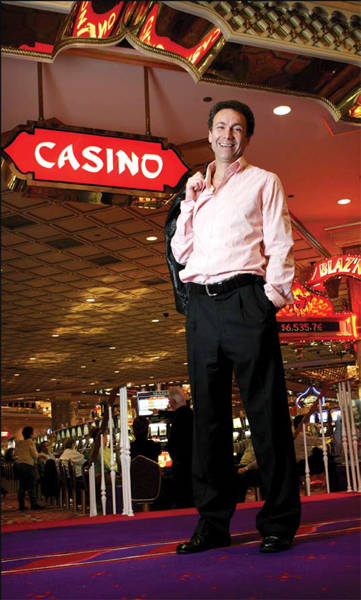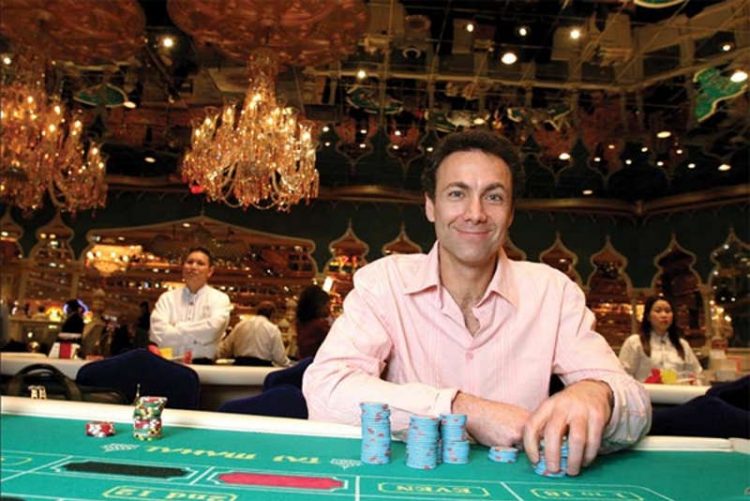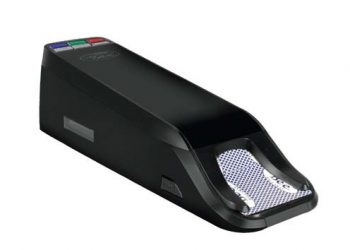Armed with only “my hands, my brains and my balls,” Richard Marcus claims to have cheated casinos around the world out of US$20 million. Steve Karoul spoke to the man considered the world’s greatest casino cheat about his perfect record thwarting casino security
After twenty five years as a professional casino cheat, Richard Marcus retired on New Year’s Eve in 1999. The casinos are still after him, but not with a view to claiming back their losses.
Since his retirement, Mr Marcus has written four books on his exploits. He was inspired to tell his tale after watching the Steven Spielberg film “Catch Me If You Can,” based on the true story of legendary con artist and impersonator, Frank Abagnale, Jr (played by Leonardo DiCaprio).
Like Frank Abagnale, Richard Marcus now consults for the very people who once sought to stop him. Unlike Mr Abagnale, however, Mr Marcus was never caught, and now that the statute of limitations on his misdeeds has lapsed, he never will be.
The following are excerpts from Steve Karoul’s interview with Richard Marcus about how he managed to cheat casinos from Las Vegas to Europe to Macau for so many years, and his current career educating casino staff on how to better protect their tables from people like himself:
Steve Karoul: What did it take to become the world’s greatest casino cheat?
Richard Marcus: Well, it was a combination of three things: courage, brains and lack of greed. First and foremost, you have to overcome whatever fear you have of getting caught. Then you have to be intelligent enough to design and carry out creative casino cheating moves that work. Third, and certainly as important as the first two requisites, you have to know when to stop – in other words, don’t be greedy. The old saying about going to the well too many times applies to casino cheating as much as anything else.
I guess it’s hard to find people with all three of those prerequisites?
Very. Some guys out there have tremendous courage, some have rocket scientist’s brains, but few have both. And some guys have courage for many things but not for casino cheating when they know that so many different people and the surveillance cameras will be watching every move they make or might make. A funny story occurred back in Atlantic City one night after a big heavyweight fight. I was standing next to a New York wiseguy watching my partner do a blackjack pastpost move, which is switching in higher denomination chips after the bet wins. It so happened that this wiseguy was an acquaintance of my partner. He had nothing to do with our casino cheating operation. However, after witnessing the move and my partner’s coolness under pressure, the wiseguy whispered, “You got guts kid. I’d sooner fight Mike Tyson than try that!” And, believe me, he’d give Mike Tyson a good fight. Guts and courage are only part of what’s required to be a good cheat. Skill is an even more important requisite. Not everyone has both.
How hard is it to know when to stop?
That depends on the person. For someone levelheaded enough, as I’ve always considered myself to be, it was just a matter of surveying a casino after I did a cheating move. If the move was absolutely clean with none of the casino personnel having been bothered, then I would go right back and do it again, and again, as long as no one was picking up on what I was doing. But once a little heat started coming down, I would just cash out and go to another casino, even another gambling town if it got hot enough.
Some cheaters take the attitude to keep working under adverse conditions, until they’re taking tons of heat. This is imprudent and often leads to getting caught. I always had the attitude that the casinos were always there for the taking, so if conditions were not right, I’d just let them hold on to “my” money until the next time. Schedules vary and staffing varies especially in large casinos, so with a little patience I would wait until I found the weak links and then make my moves. But if I sensed any pressure or heat at shift change I would simply cash out and leave.
What was your specialty in cheating the casinos?
I was a chip (check) manipulator. Either I pastposted bets after they won, or did the opposite; greatly decreased the size of my bets when they lost, which is called dragging or pinching.
The first part about pastposting, I understand. But what about decreasing the size of your bets after they lose? How is that possible? Once they lose, doesn’t the dealer take the chips?
[Chuckles]. Yes they do. But it’s actually a dragging move that I’m most famous for, or should I say “infamous?” I came up with a roulette move where I bet a $5,000 chip underneath a red $5 chip on outside roulette bets. When the bet won, I collected either five or ten grand, depending whether it was an even-money or 2 to 1 bet. When it lost, I lost only ten bucks. I named the move “Savannah” after a stripper I knew at the time. This move is widely considered by the upper echelon surveillance people as the best casino cheating move ever. I surely agree with them. I demonstrated it at the recent World Game Protection Conference (WGPC) in Las Vegas, and the audience, which consisted of key casino personnel from all over the world, was quite impressed.
But how did you pull off such a move without getting caught?
[Chuckles again, louder]. Well, the key was I placed the $5,000 chip underneath the $5 chip in a way that it was hidden from the dealer. In other words, the dealer knew there were two chips there but couldn’t make out the denomination of the bottom chip and therefore assumed it was another $5 chip. So when the bet lost, I raked it off the layout before the dealer could sweep it. If I was caught, I’d just go into a drunken routine and claim in slurred words that I didn’t realize that the ball had dropped. Then I would put back the two $5 chips I’d had palmed in my hand. Since the dealer believed my original bet was just that, two $5 chips, there was never much of a problem.
What happened when the bet won, especially if the dealer didn’t know the $5,000 chip was there?
I immediately started ranting and raving with joy, pointing to the bet, screaming, “There’s my $5,000 winning chip!” The beauty of it was that when they went to surveillance to verify that it was a legitimate bet and not pastposted, the cameras backed me up every time! The move sounds ridiculous, right? Well, maybe so, but it made millions and the casinos never figured it out until I wrote about it in my memoirs, “American Roulette.”
So now you’re no longer a casino cheater. Are you actually helping the casinos now?
Well, I retired from cheating seven years ago and have since written four books, the first of which, “American Roulette,” is being made into a feature film. I’m not yet ready to completely retire, so what better way for me to stay busy than by consulting to casinos? Gaming is the only thing I know in life, so that’s what I’m doing to keep occupied.
What services do you offer casinos?
Complete game protection training for educating their floor staffs and surveillance departments including everyone from dealers to cage employees. I teach dealers how to be less vulnerable to cheaters and what methods they can employ to sharpen up their defenses. I actually give them a mental checklist to perform before each deal of cards, roll of the dice, or spin of the roulette ball. I teach floor people how to spot the scams and how to spot the ones that their very own dealers may be involved in. I teach surveillance observers to recognize things their cameras are showing them that are not always evident.
What do you find to be the casinos’ major weaknesses against cheaters?
On the floor, it’s mainly that dealers, floor-men and pit bosses are all far too dependent on the “eye in the sky” or the cameras. They figure that since every square inch of casino space is taped 24/7 they don’t have to be on their toes. Not so. I like to say, “Remember, a camera is not going to tap a pit boss on the shoulder and say, ‘The guy on blackjack table number four just made a move.’” It has to work the other way. The people on the floor have to know what they are looking for, as well as looking at. The cameras are just like computers. If you don’t give them proper input, you don’t get proper output. So I teach not only the scams but the subtleties that indicate a scam might be in the works. It is a different type of educational approach that the casino staffs really enjoy.
Are high-level surveillance people comfortable with learning from the world’s greatest casino cheat? I mean, is there ever reluctance on their part?
If so, it dissipates quickly once they listen to me. After all, who is better able to teach this stuff than someone who’s spent most of his adult life doing it? Practically all of the so called experts who teach game protection to casinos have never been out in the actual field like I have. They’ve never been cheaters so there is a limit on their knowledge. In fact, at the WGPC [World Gaming Protection Conference] in Las Vegas, two surveillance directors from major Las Vegas casinos told me that they came to the conference only to see my presentation. Both admitted they were enlightened by what I had to say like never before. I certainly appreciated those comments. I really do enjoy teaching casino people the tricks of the trade. And I do guarantee prospective casino clients that my services will save them thousands and thousands of dollars each year.
Do you ever miss it? The thrill of cheating and getting over on the casinos and their multi-million dollar surveillance equipment.
I guess that’s like asking a retired athlete if he misses the spotlight. You know, sometimes I think about those days and say, “Boy, I had fun, I made good money and I never got caught or arrested,” but as long as I stay busy now, I don’t really miss it. I do, however, love telling war stories about some of my greatest cheating experiences.

Steve Karoul concludes: “Richard Marcus is the real deal, dealer and cheater. I have spoken to several high level gaming friends that have seen Richard’s seminars and conferences and they all say that he is very, very good if not the best cheater that they have ever seen. Richard is available and puts on a great educational program for your staff. Remember, we train dogs and we train dolphins but we educate people. If anyone would like additional information about Richard’s ‘educational programs’ designed to help casinos better understand cheating and enhance their staffs’ ability to guard against such scams, please email me for details.”
Steve Karoul is one of the world’s leading casino marketing consultants with almost 30 years of experience with top casinos both in the US and internationally. Steve can be reached by email:skaroul@comcast.net. His website: www.euroasiacasino.com.































